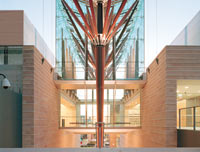|
||||||||||||||||||||||||||||||||||||||||||||
| Energy Efficiency - SOLA5057 | ||||||||||||||||||||||||||||||||||||||||||||

Description If Australia and the world are to reduce emissions of greenhouse gases, both renewable energy and more efficient use of that energy will be required. Energy efficiency is the cheapest, fastest, safest and simplest way to reduce emissions. This course covers the various methodologies, technologies and policies that can be used to reduce energy use, while still producing what that energy is needed for - heat, light and movement.
Topics covered include current and predicted energy use and associated GHG emissions; residential and commercial passive solar design; energy management programs; building management systems; heating, ventilation and air conditioning; and consumer products and office equipment. The impacts of transport are also covered, together with opportunities to reduce transport energy requirements through more efficient engines, public transport, and urban design. Industrial systems examined include heat recovery; cogeneration; compressed air and steam distribution; and motor systems, pumps and fans. Efficient use of water, and increased efficiency of water supply can also significantly reduce energy use. Various government policy measures at the local, state, commonwealth and international level are covered in terms of their effectiveness and relevance in Australia. Finally, barriers to improved energy efficiency such as up-front cost, lack of information, and the low cost of energy in Australia are examined. Assignments focus on energy use and emissions produced at your home and by your transport to and from the UNSW, and will also analyse current energy practices at the UNSW.
|
||||||||||||||||||||||||||||||||||||||||||||


